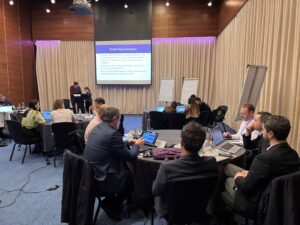
On April 3, the International Training and Education Center for Health (I-TECH) launched the Informatics and Data Science for Health (IDASH) fellowship training program with an in-person workshop in Tbilisi, Georgia. The program launched in partnership with the United States Centers for Disease Control and Prevention’s Eastern Europe and Central Asia (CDC/EECA) Regional Office, the World Health Organization (WHO) Europe, and country governments.
The first IDASH cohort includes 20 fellows from Georgia, Kazakhstan, Kyrgyzstan, Ukraine, and Uzbekistan. Participants include mid- to senior-level technical, analytical, and public health staff working at the national level in public health informatics or data science.
“After several whirlwind months of collaboration and engagement with stakeholders from the five countries, it’s amazing to welcome the first cohort of IDASH to Tbilisi for the first of three in-person workshops,” said Stacey Lissit, MPH, MS, Senior Technical Advisor for the IDASH program.
Fellows will participate in a 12-month in-service training program, in which each country team of four fellows will identify and develop a collaborative project. Fellows will receive sustained mentorship, and regional communities of practice will be established to ensure regional collaboration, share lessons learned and best practices, and establish linkages for future programming needs that span multiple countries.
“IDASH provides the opportunity to link learning to experience, and enables the application of new public health skills, knowledge, and techniques acquired from the training in a real-life context,” said Peter Rabinowitz, MD, MPH, Principal Investigator for the IDASH project. “It also extends benefits beyond the trainees to partner agencies and organizations, helping strengthen public health capacity in the region.”
Proposed fellowship projects include automating data analysis and visualization for diseases, expanding digital immunization registries beyond COVID-19, and developing spatial analysis modules for multi-disease surveillance and response.
“Today, the afternoon of the 4th day, the room is buzzing as the five country teams are hard at work: two engrossed in consultation with our facilitation team of public health informatics and data science experts about their country team projects; the others working on a data science methods exercise, practicing interpretation of descriptive and inferential statistics plots to assess trends in Hepatitis C,” said Ms. Lissit. “The energy and engagement have been high, and we’re looking forward to the next six days and the rest of the year-long fellowship.”
IDASH goals are to enhance capacity to create and use public health information systems that enable the capture, management, analysis, dissemination, and use of reliable, timely information to improve population-level health outcomes, as well as strengthen regional capacity to effectively respond to future global health challenges and pandemics.
“The COVID-19 pandemic made clear the importance of public health data systems that provide real time, accurate data on disease threats to allow for timely intervention and combatting of mis- and disinformation,” said Dr. Rabinowitz. “Programs like IDASH will help ensure there is a workforce prepared to detect, prevent, and respond to future global health threats.”
Story updated: April 11, 2023